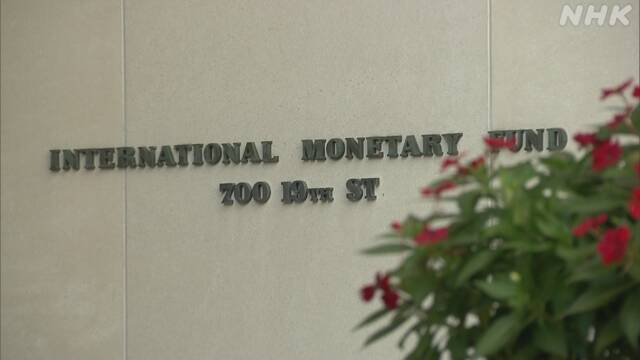The IMF = International Monetary Fund has revised its global economic growth outlook to 3.6%, 0.8 points lower than previously expected.
With the rise in energy and grain prices triggered by Russia's invasion of Ukraine, the invasion has had a major impact on the world economy.
The IMF released the latest outlook for the global economy on the 19th, lowering the global growth rate of this year to 3.6%, down 0.8 points from the previous time, three months ago.
This is because Russia's military invasion of Ukraine has spurred soaring energy and grain prices, and strict economic sanctions on Russia are expected to reduce trade in each country.
Of these, Russia, which is subject to economic sanctions, will reduce it by 11.3 points to minus 8.5%, and Ukraine will also drop its growth rate to minus 35%.
In addition, the growth rate of the euro area, which has a close economic relationship with both parties, was revised downward by 1.1 points to 2.8%.
Of these, Germany will be reduced by 1.7 points to 2.1%, which will be greatly affected among the countries, and Italy will also be reduced by 1.5 points to 2.3%.
In addition, Japan was also affected by high crude oil prices and was reduced by 0.9 points to 2.4%.
The United States said it had limited economic ties with Russia, down 0.3 points to 3.7%.
On the other hand, in China, where the infection of the new coronavirus has spread and strict regulations continue, it was reduced by 0.4 points to 4.4%.
The IMF warns that "war is uncertain about the future of the world economy. The division of the world also hinders the cooperation of countries that are essential for long-term growth."
IMF Top "Clear Threats to Countries' Economy"
In an interview with NHK, IMF, the head of the International Monetary Fund, said in an interview with NHK, Russia's invasion of Ukraine "has been on the verge of crisis while it has not yet recovered from the effects of the new coronavirus. It has spurred on and poses a clear threat to the economies of many countries, "he said, raising concerns about the impact on the global economy.
He added, "The world situation is tense, but it is clear that cooperation from each country is needed to prevent further deterioration of the world economy." I called it indispensable.
Price increases in Japan
Prices continue to rise in Japan, partly due to Russia's invasion of Ukraine.
The consumer price index, which shows the price movements of goods and services consumed at home, rose by 0.6% in February, excluding fresh food, for the sixth straight month.
In particular, the price of "energy" such as electricity and gasoline rose by 20.5%, and the price of "food", which accounts for a large proportion of households, also rose by 2.8%.
The corporate price index in March, which shows the prices of goods traded between companies, has risen to the level for the first time in 39 years, and there are concerns about the deterioration of corporate profits and the slowdown of personal consumption due to the rise in prices.
Invasion of Russia Affects German companies
German companies are also affected by soaring energy prices and sanctions against Russia following Russia's invasion of Ukraine.
Manufacturers of fans used in factories and hospitals headquartered in southwestern Germany are no longer able to ship parts from Germany to Russian assembly plants, which account for 2% of the company's sales, due to economic sanctions on Russia. ..
Thirty people were working in the Russian factory, but it was closed because it could not be assembled.
It also has the indirect effect of the disappearance of businesses planned in Russia by companies in other countries where their fans were supposed to be delivered.
In addition, the price of natural gas used in factories has risen, and the replacement of nickel from Russia, which has stopped importing, is being procured at a high price from other sources, resulting in higher manufacturing costs and a harsher business environment.
Peter Fenkle, president of Ziel Arbeck, a fan-manufacturing company, said, "We are concerned about the many anxieties that affect our company. As a person and to continue our business, we are at war. I pray every day that it will end. "
German consumer price index rises record
Germany's consumer price index rose 7.3% last month compared to the same month of the previous year, the highest record rise since East and West Germany were unified in 1990.
Talking to citizens in the capital Berlin, they say, "I'm afraid to see electricity and gas invoices," and "Energy, groceries, everything is rising. Don't buy what you don't need and save a lot. I heard a voice saying, "I'm doing it."
Energy prices, which have risen internationally due to the effects of the situation in Ukraine, have risen particularly sharply, rising 39.5% last month compared to the same month of the previous year.
Under these circumstances, an increasing number of people in Berlin are buying firewood and charcoal, whose demand usually declines during the spring season.
Many homes in Germany are equipped with gas-fueled heating, but some older homes still have wood-burning stoves, and people living in those homes use the stove again because of concerns about rising gas prices. It means that they are buying for the sake of.
According to the shop owner, this month's sales are expected to be 1.5 times higher than usual, and he said, "It's as busy as before winter. I've been asked by a customer for the first time in 30 years to deliver a lot." Was there.

